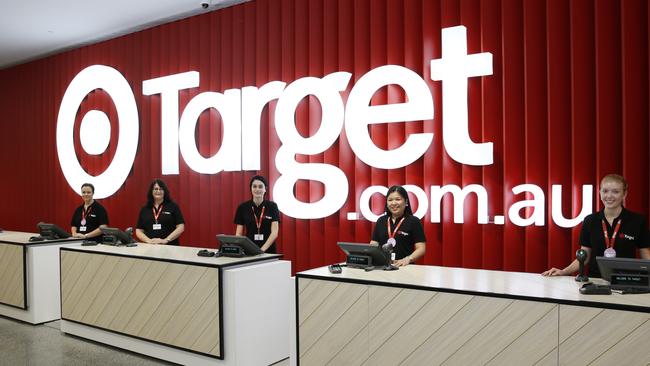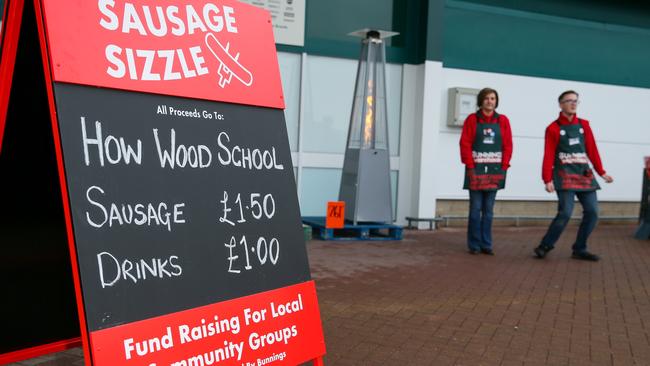Wesfarmers’ Rob Scott faces urgent task to fix, or axe, Target and Bunnings UK
The Coles spin-off is piling pressure on Wesfarmers’ Rob Scott to deal with poor performers Target and Bunnings UK.

The rationale for the demerger is compelling. Shifting businesses that represent 60 per cent of Wesfarmers’ capital employed, that generate only 34 per cent of its earnings and that have a likely solid but unspectacular growth outlook, will dramatically improve Wesfarmers returns on capital and Scott’s ability to make decisions that will have a material impact on the smaller group’s financial metrics.
Where anything but a company future-wagering acquisition wouldn’t have shifted Wesfarmers’ numbers meaningfully while Coles remained within the portfolio, Scott will have the ability to make acquisitions that do move his numbers.
The other side of that equation of course, is that a poor acquisition — or a poorly performing business within the remaining portfolio — will have a more damaging and visible impact on returns once Coles has been demerged.
Given that he has two poorly-performing operations in the existing portfolio Scott has until the demerger, either very late this year or early next year, to fix them or axe them.
The two operations are, of course, Target and Bunnings’ UK business.
Target, despite the latest writedown of its book value by just over $300 million at the half-year, is the less challenging of the two problem children.
In the December half it was profitable, albeit modestly so, generating $33 million of earnings before interest and tax in the six months.
Its sales base continues to shrink (down 6.5 per cent in the half) but Guy Russo and his team have stanched haemorrhaging that peaked at nearly $200 million a year and given Scott time and, potentially, options for dealing with the brand.
Target could, over time, continue to improve its profitability as the repositioning of the brand continues. It could be gradually absorbed into its bigger and very profitable sibling Kmart, shedding sites as their leases expire. Or it could, given that it is profitable, be sold to someone with their own ideas for refreshing the brand and its offer or with plans for its sites.

The far bigger and more urgent challenge is what to do with Bunnings UK business. The future of the UK operations is under review, with Wesfarmers’ plans to be unveiled in June.
That’s a business whose value was written down by about $1 billion in February and which lost $165 million in the December half, an unsustainable rate that immediately provoked comparisons with Woolworths’ Masters’ disaster.
Lease liabilities approaching $2 billion make the prospect of a closure unpalatable while the losses would make it near-impossible to sell the business, while also making it very clear that the status quo isn’t an option.
It wasn’t supposed to be like that. When Wesfarmers acquired the Homebase business in 2016 it had a very clear and cautious game plan. While Homebase had been losing sales and shifting formats for years, it did have about $3 billion of sales and about $40 million of earnings.
The Wesfarmers strategy was to eventually use the 265 Homebase sites for a Bunnings-branded home improvement business.
Wary of the Masters experience, however, the plan was to leave the bulk of the Homebase stores, with their odd mix of home improvement and department store-style homewares offerings, largely untouched while trialling Bunnings-branded pilot stores until there was evidence that it had a format that would successfully migrate the basics of its Australian offer into the UK market.
The pilot program has gone quite well — there are 19 stores in the program and Wesfarmers has said the early results are encouraging. As it said at the outset — and repeated after the writedown this year — achieving “proof of concept’’ for the Bunnings concept is a precursor to a broader rollout.
There was, however, a fundamental divergence between what Wesfarmers said it would do in the UK and what it has done.
The UK management, despite advice from Wesfarmers’ retail adviser Archie Norman and the original strategy team, couldn’t help themselves.
Confronted by what they saw as poorly-managed stores with a terrible offer, they moved quickly to remove concessions and change the range in a larger Homebase network that they were supposed to tinker with, not radically change. It was too much, too soon and not well-executed and Bunnings lost customers, sales and its modest UK earnings base — and shed the senior management of the UK business.

The reality that those changes have been made, and the damage done, makes the challenge for Scott and his team far more complicated.
What was the Homebase business has been structurally changed and so, rather than running a handful of pilot stores until there was a demonstrably successful format to be rolled out, Wesfarmers now needs to overhaul a loss-making network of 265 stores within a time frame made tight by the scale of the losses.
Wesfarmers’ historical preference, and Scott’s history, is to fix underperforming businesses rather than close or sell them. Inside the group there is a conviction that it will back itself to turn the Homebase/Bunnings UK business around.
Time is not on Scott’s side. Within the existing Wesfarmers’ portfolio and next to the high-performing Bunnings Australasian operations Wesfarmers can absorb the UK losses and still generate acceptable group results.
Once Coles and its $40 billion of sales and $1.6 billion-plus of EBIT have been spun out, however, Wesfarmers will shrink from a group with nearly $70 billion of revenue and $4.4 billion of EBIT to one with less than $30 billion of revenue and $2.4 billion of EBIT. Losses running at an annual rate of about $330 million, or more, in the UK would be far more material to its numbers.
Equally, of course, producing stronger performance from Target and reducing the losses and eventually producing profits in the UK would have a magnified impact on the post-Coles numbers.
Scott has been applauded for his boldness and lack of hubris, for being prepared to hive off the group’s largest business and his ambition of managing a smaller but higher-returning portfolio.
The leverage, in the post-Coles Wesfarmers, will work in both directions. Ahead of the demerger Scott will have to devise plans to make it work for him, rather than aggressively against him.
If he gets it right it will set him up for the kind of longevity in the role enjoyed by his predecessors. If he gets it wrong his period as CEO will be destabilised and undermined at its very outset.






While the proposed demerger of Coles from Wesfarmers has been greeted enthusiastically by the market, the flip side for a greatly-downsized conglomerate is that it will ratchet up the pressure and urgency on Rob Scott to deal conclusively with his two poorly-performing businesses.